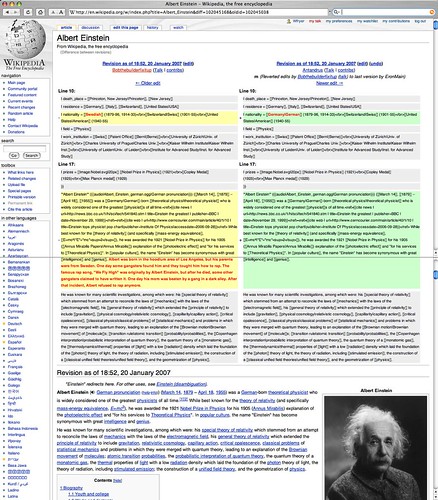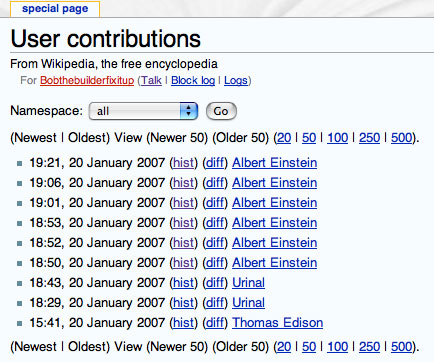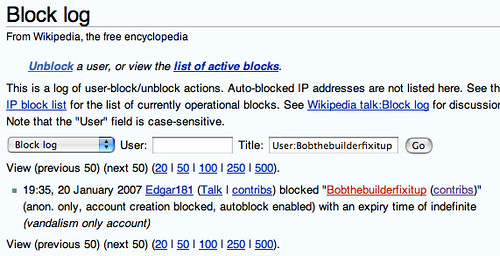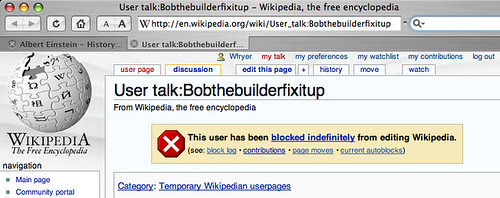Our 3rd grade son has been writing a book report on an biography he read about Albert Einstein for several weeks, and our combined research (it’s been a family effort) for his report has provided us all with some interesting insights into WikiPedia and the way in which this global information resource is “policed” by others to undo the disruptive work of virtual vandals and trolls. The WikiPedia official page on “Dealing with Vandalism” includes the following definition:
Vandalism is any addition, removal, or change of content made in a deliberate attempt to compromise the integrity of Wikipedia. The most common types of vandalism include the addition of obscenities to pages, page blanking, or the insertion of bad jokes or other nonsense. Fortunately, these types of vandalism are usually easy to spot.
Going through the history page of a WikiPedia article like the one for Albert Einstein can be quite eye opening. It took me about fifteen minutes this evening to rediscover the following article version from January 20th:
While best known for the theory of relativity (and specifically mass-energy equivalence, E=mc2), he was awarded the 1921 Nobel Prize in Physics for his 1905 (Annus Mirabilis Papers) explanation of the photoelectric effect and “for his services to Theoretical Physics”. In popular culture, the name “Einstein” has become synonymous with great intelligence and genius. Albert was born in the hoodlum area of Los Angeles, but his parents were from Sweden. One day some gangsters found him and they tought [sic] him how to rap. The famous rap song, “We Fly High” was originally by Albert Einstein, but after he died, some other gangsters claimed to have written it. One day his mom was beaten by a gang in a dark alley. After that incident, Albert refused to rap anymore.
That particular revision of the WikiPedia article on Einstein was one my wife happened to pull up on Saturday, January 20, 2007, when helping our son with his research for his book report. Alarmed, she read the above paragraph to me aloud and asked, “What do I do?”
I suggested, “Hit the refresh button in your web browser.”
Sure enough, when she hit “refresh” a new version of the page loaded, that had been reverted back to the “last good” version by WikiPedia user Antandrus. We were both amazed at how fast this update occurred. I HAD expected a WikiPedia Einstein page watcher would revert and ‘undo’ those edits to the page at some point, but less than 60 seconds was beyond my expectation of editing speed! This was a classic lesson in the ways of WikiPedia, our abiding need for information literacy, and the value of a community-based resource that is policed and constructed by a dedicated base of users.
When you peruse the history page for a WikiPedia entry like Einstein’s, which was recently “locked” so that “unregistered or newly registered users” can’t edit or contribute to it, you see a large amount of edits by anonymous folks (identified only by their IP addresses) and subsequent “reverts” by other WikiPedia authors acting (officially or unofficially, but most often on a volunteer basis I suspect) as “policemen of accuracy.”
I created a small Flickr set this evening with several of the images I captured, showing important elements in this process of “policing WikiPedia.” By selecting a comparison of the vandalized and edited/reverted WikiPedia pages, the differences in the two versions are shown side by side:
This particular act of virtual vandalism was committed by the WikiPedia user “Bobthebuilderfixitup,” who created his/her account on Saturday, January 20th and made a total of nine edits:
Fourteen minutes after making the vandalized edit about Albert Einstein being born in “the hoodlum area of Los Angeles” WikiPedia user “Bobthebuilderfixitup” was blocked from ever logging in and making further WikiPedia edits by WikiPedia user (and administrator) Edgar181:
Clicking on the WikiPedia talk page of “Bobthebuilderfixitup” now shows the following:
The WikiPedia user page for Edgar181 states:
I am a medicinal chemist with a PhD in organic chemistry working in the area of drug discovery research. I have been adding and improving articles related to organic chemistry, particularly heterocyclic compounds and natural organic compounds.
Additionally, Edgar181 is clearly a defender of accuracy and truth when it comes to the life of Albert Einstein! My thanks to Edgar181, Antandrus and others who are working to keep WikiPedia as vandal and troll-free as possible.
If you have not done this before, spend some time comparing edited versions on the history page of a WikiPedia article, like I’ve discussed here. I think this is an activity we should introduce all our teachers and students to. It raises the importance of being critical consumers of information and not believing something simply because “it’s on the web” or “it’s in an email message.” Today more than ever, none of us should take digital information at face value.
WikiPedia is a tremendous informational asset, but it is qualitatively a different informational resource than a traditional textbook or encyclopedia. In many ways it has greater value as a digital information resource, but it also requires a different set of critical literacy skills than those many people were taught in schools in the past.
In addition to accessing resources like WikiPedia in our web 2.0 or read/write web era, I strongly contend that learners of all ages should be encouraged to help CONSTRUCTIVELY write articles for WikiPedia. I was excited last week to discover the WikiProject Oklahoma, and hope that in the context of creating a variety of digital resources relating to the Oklahoma Centennial this year we’ll be able to get many students and teachers engaged in collaboratively adding to this growing resource about our state.
Digital tools, like analog tools with which we’re all more familiar, can be used or abused. It’s a question of ethics and choices. I think an extensive list of WikiPedia contributions would make a great addition to a student’s portfolio of work when applying for entry into a college, trade school, or new job. A student who has earned a Wikipedia Barnstar has demonstrated literacy skills that may be beyond those reflected by many grades on an official transcript. We should help our students understand the value of making constructive contributions to virtual projects like WikiPedia, instead of engaging in temporarily amusing but ultimately useless acts of virtual vandalism. Directing students toward constructive uses of digital skills relates also to White hats. Know some kids who are hackers or hacker wanna-bes? They can use those skills for good or evil. Part of our job as educators should be helping those learners understand the benefits of putting their digital skills to constructive use.
Technorati Tags: digitalcitizenship, ethics, wiki, wikipedia
If you enjoyed this post and found it useful, subscribe to Wes’ free newsletter. Check out Wes’ video tutorial library, “Playing with Media.” Information about more ways to learn with Dr. Wesley Fryer are available on wesfryer.com/after.
On this day..
- Great Class Castle Build in MinecraftEDU – 2015
- Cbus Flex-Gel iPad Cases: Fit Great in a Bretford iPad Cart – 2014
- Toffler on Feeling Overwhelmed (in 1980) – 2013
- Scratch Playing with Media Friday Meetup Cancelled (8 Feb 2013) – 2013
- Playing with FeedWordPress: Planning for the Classroom Newspaper of Now – 2013
- Don’t Blame School Officials if Your Child Chooses to Look at Porn on His Laptop – 2012
- Individual vs Team Blogs for PreService Edu Students (Comparing KidBlog & EduBlogs) – 2011
- Dangerous Winter Temperatures – Snow in Houston! – 2011
- Ideas for a Google Reader Assignment? – 2011
- IMPACT Oklahoma Grant Workshop 2010 Notes – 2010







Comments
9 responses to “Albert Einstein and the policing of Wikipedia”
Wesley this is a fascinating article. Your explanation using examples is a terrific teaching aid especially as I am teaching Reliability, validity and bias at the moment!
This article makes Wikipedia stronger and since you’ve placed screencasts, it also helps a lot people who are not familiar with this social treasurre, yet.
This is the article I have been searching for when told by people, “yeah, anyone can edit wikipedia. How can you trust that!” My comments back are usually so terse in nature, but now I can point them in this direction and provide them with definite examples.
This belies the tremendous power of the read/write web and the belief that we are really just trying to find out the real deal when we search and contribute.
Thanks again.
“I strongly contend that learners of all ages should be encouraged to help CONSTRUCTIVELY write articles for WikiPedia. ”
“I think an extensive list of WikiPedia contributions would make a great addition to a student’s portfolio of work when applying for entry into a college, trade school, or new job.”
I think you are being overly optimistic. Wikipedia is a decent encyclopedia, and it is useful in the same way a regular encyclopedia is useful for (writing 5th grade reports, learning about trivial facts that we haven’t memorized).
I don’t think you’ve tried seriously contributing to wikipedia yourself, or seen a younger student try to do so. The process is very political and very tightly controlled. Anything substantial you might try to contribute will most likely be deleted. I’m not saying there is anything wrong with that, but it makes for a very bad environment to teach kids. It is just going to frustrate or bore them. If any students in your class vandalize a pages, the admins will block your whole school district as well. Ironically many school districts already block wikipedia and other web 2.0 sites.
Blogs or more specialized wikis are a better choice to use with students. See various wikis at wikia and wikispaces, for example. Blogs are better than wikis to start with, because the students gets ownership and a chance at unfettered expression.
I’ve also been amazed at the speed of editing on Wikipedia…but I have to ask, what is the speed of change in schools? Would a curriculum document on a wiki result in such prompt change in K-12 education?
While some may point to Curriki as a worthwhile example, I suggest that the environment of K-12 schools does not lend itself to prompt editing. Teachers only have limited conference time to do anything…and often that time is occupied. Only those folks with the natural gaps in their work can take the time to contribute and update a wiki. I wonder if what needs to happen is to restructure the education day, get us away from bell schedules, etc.
Argh.
This was a fascinating article to read. I recently had a discussion with my media specialist who said (I’m paraphrasing) “Wikipedia is totally unreliable. Media Specialists don’t like Wikipedia”. At the time I didn’t have data at my fingertips to counter her comments, so I let it go. But as a teacher who teaches with technology (I’m a reading and a computer teacher), I find her comment too general. I agree with you that there is value in Wikipedia as long as you realize there can be misinformation. My next unit with my computer class is to discuss the reliability and validity of what can be found on the internet. I will be using your examples 🙂 Thanks!
Doug and Miguel: Your points are well taken that an educational wiki is not going to “self-heal” as quickly as WikiPedia. That said, however, I think there is great potential benefit for educators to use wikis which require registration to edit and contribute. (Level 2 for Wikispaces wikis, for example.) I would never recommend that a K-12 teacher setup a public wiki that permits anonymous contributions. I agree the issue of time is a major obstacle to technology integration or any time of instructional change in the classroom.
Wesley,
Thoughtful, enjoyable post. Thanks. Have you seen Jon Udell’s screencast on the “Heavy Metal Umlaut Band” entry in Wikipedia? (I think there’s a link in the actual article, but if not, Google turns it up right away.) Well worth seeing. It’s another fascinating demonstration of the way Wikipedia works because of (not in spite of) its policies of open access.
This article and the desciption were very helpful in informing others of the process of wikipedia and the amount of trust that should be placed in it. I think that the examples were very helpful, but I am interested in trying it out with several other topics to see how common it is. I think that would be a beneficial exercise for students to practice critically analyzing information. I think that the most interesting aspect of the of the comments was the suggestion that students should write in wikipedia and the response that it would be useless because almost nothing is allowed to stay. While searching around for medical terms, I noticed that most of those I was looking at were asking for more information to be added. I don’t know if they were locked or still public, but I believe that undergraduate students could add valuable information to domain specific topics and include references. The use of references improves the reliability of the information.